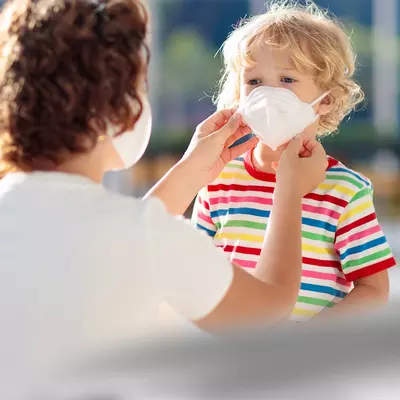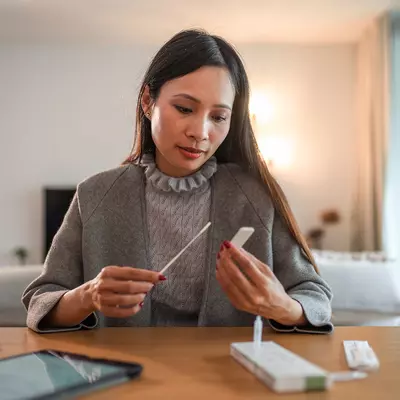- AdventHealth

The passing of a loved one is difficult to bear, even in normal circumstances. In the midst of the coronavirus pandemic, feelings of grief and sadness may be amplified by stress and uncertainty.
In addition, many of the typical rituals that honor a person’s life and mark their passing may look different as we continue to take steps to reduce the spread of the virus. This can make it more difficult to adapt to the reality of life without that person’s presence.
Everyone grieves in their own way — there’s no right or wrong way to process loss. Understanding some of the emotions you may feel, and sharing them with others, can go a long way in helping you cope.
Taking active steps to honor the person’s memory and spirit can go hand in hand with managing your mental health. One way to do that is to reach out to mental health professionals who can deliver care remotely.
It’s OK to Not Be OK, and Help Is Here
If you or someone you love is struggling with the grieving process, you’re not alone. If you’re thinking about hurting yourself, know that you don’t have to act on suicidal thoughts or feelings. There are trained crisis counselors who are here to listen and want to talk with you, whenever you need them, on the National Suicide Hotline at Call1-800-273-8255 and on the Crisis Text Line when you text HOME to 741741.
Understanding the Symptoms of Grief
Grief refers to the whole spectrum of reactions you may have to losing someone. Many grieving people report changes in their:
Actions
You might find it difficult to eat, talk to others or do things you once found enjoyable. On the other hand, you may grow restless and feel the desire to stay busy.
Emotions
You might feel shocked, numb or sad at first. This may be followed by denial, anger, guilt, frustration or helplessness. Crying is normal, and it’s OK.
Sensations
Grief can trigger physical changes. Your chest or throat may feel tight or heavy. Nausea or an upset stomach are common, as are dizziness, headaches, physical numbness, muscle tension, trembling and fatigue. Nightmares may interfere with your sleep.
Thoughts
Disbelief, confusion and preoccupation may dominate your thinking. You might question whether you, or someone else, could have done something differently. At times, you may have trouble concentrating, or even develop hallucinations. For instance, you may hear or feel the presence of the person who has died.
Remember that the stages of grief don’t happen at a progressive pace, and grief doesn’t always proceed in a straight line. Often, it comes in waves or cycles. Some days may feel better, while others are more painful.
The more patient and flexible you are with yourself and with others, the healthier you’re likely to stay over time. In fact, there’s even evidence that some people find deeper meaning in their lives after the loss of a loved one.
This doesn’t mean you won’t feel sadness and sorrow. However, you may gain a new perspective and resilience to face challenges in the future.
Added Challenges of a Pandemic
The coronavirus pandemic has made death more present in daily life, and at the same time, interrupted our rites and rituals surrounding it. In addition to the normal emotions that accompany loss, it’s normal to also feel:
- Anger at, or the desire to place blame with, institutions, leaders or other people who have not followed guidelines to reduce risk, and you may even feel angry at the person who died
- Frustration that you couldn’t visit the person who was dying or attend a funeral afterward
- Guilt that you have survived while someone else did not
- Isolated from other friends and family members who are also grieving, or who might otherwise be present to support you
It may also seem like your loss and sadness are minor compared to what others are going through. While these unprecedented times have placed us all under strain, it’s important to recognize your grief. Someone’s experience being different from yours doesn’t mean your grief isn’t valid. Your grief is valid, and you deserve help and support to get through this difficult time.
How to Cope With Loss During the Coronavirus Pandemic
Recognizing grief is the first step in accepting the finality of loss, understanding what it means to you and adapting to a new normal. Avoid telling yourself you should feel a certain way, and try to not let others dictate your emotions. Allow yourself to feel pain, or any other feelings that arise.
As you go through the grieving process, you can grieve and take steps to protect your mental health, too.
Control What You Can
While this loss is outside of your control, there’s still a lot you can do to manage your risk of getting sick with COVID-19. You can still stay home as much as possible, wash your hands frequently, abide by physical distancing recommendations and keep up a daily routine while staying safe at home.
Craft New Rituals
If you feel up to it, you can hold a virtual remembrance or service. You could create a memorial on social media and ask friends and family members to add to or share it. Livestream or record funerals and burials, if you have access to technology and can do so respectfully. You can also plan to hold a service in person later on, when guidelines for physical distancing have changed.
Delay Important Decisions, if Possible
A loved one’s death may mean changes to your finances, living situation or responsibilities. While you may have to make some tough choices right away, delay other major decisions, such as moving, changing jobs or altering other relationships. Not only are these steps more difficult in the midst of a pandemic, they’re emotionally driven and have a big impact on your life overall.
Forgive Yourself
You may feel regret for things you said or did while your loved one was alive — or things you left unsaid. You may also blame yourself for what happened. Processing this pain leaves more space for happy memories.
Get Creative
Expressing your feelings through music, art, scrapbooks, or planting flowers or trees may prove healing for you. You may also choose to document your emotions and memories in a journal. Reading the entries later can also help you understand how you’ve moved through the grieving process over time.
Mind Your Media Intake
Hearing more about the pandemic when you’re already struggling can add to your burden. You can still stay informed, but take breaks from watching television, reading the news or following updates on social media.
Practice Gratitude
Even the hardest days have bright spots. Write down your strengths, happy memories or what has gone well lately. Reflect on the good things going on, or people, places and things that make you happy. If you feel up to it, share your list with people you love.
Stay Connected
Resist the urge to isolate yourself further. Call, text or video chat with friends and family. Share your emotions, and ask how they’re coping, too. Talking about your loss can be comforting and remind you that you’re not alone.
Take Care of Yourself
Though you may feel less motivated to do so, it’s more important than ever to tend to your own body and mind. Try to exercise, eat healthy food and get enough sleep when you can.
When to Seek Help for Your Mental Health
It’s normal and natural to seek help during the grieving process. You might find it fulfilling and helpful to work with a mental health professional, like a psychiatrist, therapist, spiritual guide or other type of provider.
Signs that you may benefit in seeking help include:
- Blaming yourself for the person’s passing
- Feeling worthless, or that life is meaningless or empty
- Inability to appreciate good memories about the person who’s gone
- Inability to go about your daily life, participate in daily activities or take care of yourself
- Lingering trouble eating and sleeping
- Loss of your own identity or purpose
- Ongoing denial of the death, or excessively avoiding reminders of it
Sometimes, these emotions can be so intense they represent an emergency. If you feel overwhelmed and unsure of what to do next — or if you’re thinking about hurting yourself or someone else — seek immediate help.
In an emotional crisis, get immediate help by calling the Disaster Distress Helpline at Call1-800-985-5990, or text TalkWithUs to 66746. Or, call the National Suicide Hotline at Call1-800-273-8255 or text the Crisis Text Line by texting HOME to 741741.
Also, stress and grief may feel more difficult to manage if you have a preexisting mental health condition. If you already have a mental health care provider, continue with your treatment as you process your loss. Stay alert for new or worsening symptoms, and report them to your doctor or therapist.
Helping Others Who Are Grieving
If someone else has experienced a loss to COVID-19, you can be an important source of support for them. Check in with them regularly — call, text, email or video chat. They may not feel up to responding, but they’ll know you care about them and are there for them. You can also send a card or care package, write a thoughtful letter or shop online to send them groceries or other items they may need.
We’re Here for You During the Coronavirus Pandemic
We’re committed to providing the latest information to keep you and your family healthy. You can find free, confidential mental health resources, available to anyone at any time, on our coronavirus mental health resources page.
To stay updated on coronavirus, and learn how to protect yourself or what to do if you or a loved one feels sick, visit our Coronavirus Resource Hub. Check in as often as you’d like so you and your family can stay informed and confident.



